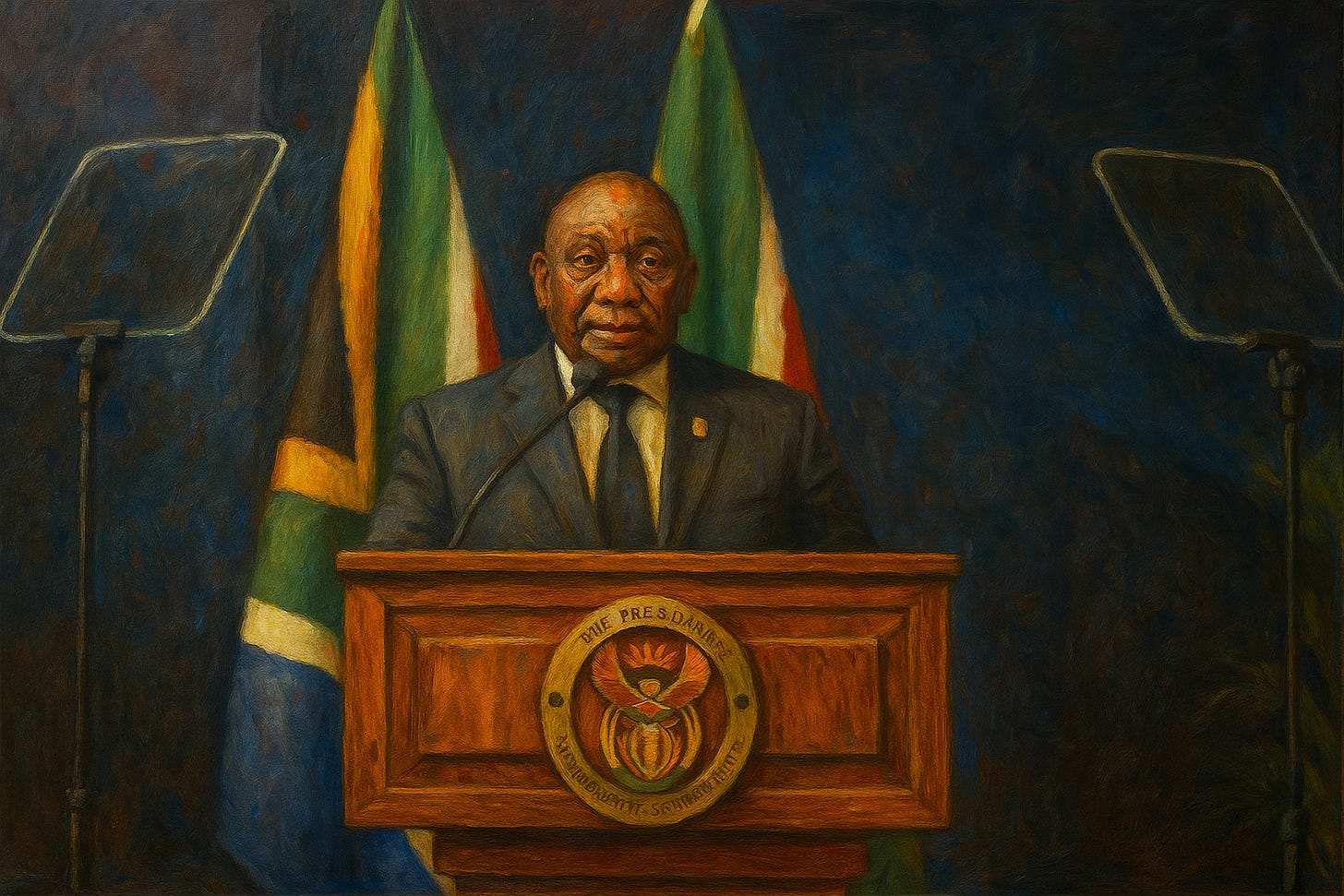The National Dialogue Is Another Conversation We Don’t Need
True diversity is diversity of opinion.
President Ramaphosa’s National Dialogue, announced this week with great fanfare and a polished list of thirty-odd “eminent persons,” is being sold as a moment of renewal. A chance, we are told, to reflect as a nation, to reimagine the future, and to forge a new social compact. But what it really is, is more of the same, namely a soft, well-lit room for consensus thinking dressed up as national introspection that promises change but will achieve none.
Let me be blunt. This group of prominent South Africans (nothing against them personally) does not represent the country. Not in substance and not in the way that matters. They are, by and large, respectable figures who’ve already bought into the ruling consensus. Their appointment is not a demonstration of inclusiveness. It’s a demonstration of how narrow our intellectual bandwidth has become.
Yes, the list ticks boxes. There’s a spread of races, professions, genders, even a sprinkling of provinces and faiths. But the diversity here is mostly cosmetic. It is skin deep (excuse the pun) and that’s the problem. What we’re missing is the only kind of diversity that really matters in a democracy, namely ideological diversity or diversity of thought.
There is no room in this "dialogue" for voices that reject the dominant narrative of post-1994 South Africa. No space for someone who might seriously question the transformationist orthodoxy that has gripped our institutions since the dawn of democracy. You won’t find a Mbeki-era black economic nationalist in that room, and you also won’t find a classical liberal, a market reformer, or a serious social conservative. No one to ask whether affirmative action has helped or hindered. No one to argue that state power might be part of the problem, not the solution. No one to admit that cadre deployment, racial bean-counting, and dependency politics have hollowed out the state and left millions trapped in poverty.
Instead, we get a rehash of the same tired establishment: business leaders who know which ideological tunes to play, activists turned parliamentarians turned activists again, the always-available clergy, and a few artists and athletes for moral ballast. These are not independent thinkers. They are emissaries of the same consensus that has presided over this slow-motion failure.
This is therefore not a dialogue but another group recital.
What’s Left Unsaid
South Africa’s problem isn’t that we haven’t talked enough. It’s that we keep talking around the real issues. The Zondo Commission, the National Development Plan, the many “Summits” on jobs, crime, education, gender, none of these led to meaningful change. Not because South Africa lacks good people or good intentions. But because our politics is allergic to fundamental self-examination that actually changes the way of thinking.
No one in ANC and its ideological partners (which include other political parties who share the ANC’s ideology to varying degrees) is willing to say the obvious, that transformation, as it has been practiced but in principle as well, has not delivered. It has produced a bloated, patronage-ridden state, elite enrichment, and symbolic change dressed up as attempts at social justice. Meanwhile, unemployment has grown, public schooling has deteriorated, violent crime has surged, and municipalities have collapsed under the weight of incompetence and graft.
Transformation was supposed to be the engine of equality and dignity. What it became was a system for recycling privilege under a new name.
Of course, none of this is allowed to be said in polite company. To question transformation is to invite accusations of being “anti-progress” or worse. But that’s precisely why this National Dialogue will fail. It cannot ask the hard questions because it has already decided the answers. It reminds of Albert Einstein’s definition of insanity, doing the same thing over and over again, and expecting a different result.
What South Africa desperately needs is not another forum for talking, but a reset of its intellectual and moral assumptions. We need to break free from the stale binaries that pit race against merit, redistribution against growth, state power against private initiative. We need a politics of ideas, not identities.
This country has no shortage of thinkers willing to challenge the status quo. Some are academics. Some are community organisers. Some are religious leaders. Some are ordinary citizens who’ve simply seen too much and are no longer afraid to speak plainly. But almost none of these people are in the room.
And that tells you everything you need to know and expect of this conversation initiated by President Ramaphosa.
Because if this were a real dialogue, an honest confrontation with our national condition, you’d invite the heretics. You’d welcome people who say uncomfortable things, who break with orthodoxy, who don’t wear the right ideological uniforms. You’d include people who think the Constitution needs amending, and those who think it needs defending more fiercely. People who think social grants are a moral imperative, and those who think it’s a dead-end distraction. People who do not adhere to the transformationist orthodoxy because the 30 people already invited already have that side covered.
But ideological diversity is too dangerous to the ANC that’s still clinging to its political plurality. Ideological diversity risks disruption. It makes too many sacred cows and entrenched interests nervous. Better for the ANC, it seems, is to assemble a group of safe hands who will talk about “values,” “cohesion,” and “shared futures,” while avoiding the minefields of actual disagreement and what is necessary for actual change. It’s the old classically South Africa tale of being more focused on talking about progress than making actual progress.
We Can’t Reform Our Way Out of This
The central conceit of this National Dialogue is that we just need a better conversation. But we’ve been having conversations for three decades. The failure of South Africa is not a failure to speak and talk about problems. Politicians have been doing this quite fine. The failure of South Africa is the failure to change course.
Transformation (or transformationism more specifically) which has been the cornerstone idea of post-apartheid governance is a project that cannot be “reformed.” It must be abandoned and our focus must shift to actual progress. You can’t fix broken incentives with nicer slogans and you can’t legislate dignity and economic growth.
What we need are new ideas. Ideas about education that don’t revolve around centralised departments and failing unions. Ideas about growth that don’t start with handouts but with private enterprise. Ideas about justice that aren’t obsessed with race but with outcomes. Ideas about citizenship, responsibility, family, law and order, and the kind of society we want our children to inherit.
But these ideas are out of bounds to the transformationists. Not because the ideas have been tested and failed, but because they don’t fit the dominant narrative and would in effect be an acknowledgement that what the ANC has promised since the Freedom Charter has failed.
More articles:
If you found this piece worthwhile, feel free to share it with someone who might appreciate it.
To get future essays delivered directly to your inbox, you can subscribe here:
I welcome thoughtful conversation—feel free to reach out on LinkedIn or follow along on Twitter.
An edited version of this article was published on Politicsweb. If you'd like to support my writing please subscribe and consider a pledge.
This cover image was created using ChatGPT.






